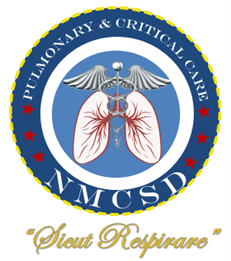- Rotation Director: Robert Trentacosta, D.O
- Rotation Location: NMCSD San Diego
- Rotation Duration: One 4-week block
- Trainees/month: One
Rotation Description:
This month is designed to provide the fellow with an intense experience in the pulmonary function laboratory.
Education Purpose and Rotation Description:
Competency-Based Goals and Objectives:
Patient Care
Fellows must be able to provide patient care that is compassionate, appropriate, and effective for the treatment of health problems and the promotion of health.
- Develop the ability to supervise the performance of and the accurate interpretation of the various pulmonary function tests performed in the NMCSD PFT Lab.
- Become proficient at the following studies: screening spirometry, bronchodilator response, arterial blood gas analysis, quantitative shunt studies, diffusion capacity, lung volume measurements, airway resistance and conductance measurements, tests of respiratory muscle strength, bronchoprovocation testing, and cardiopulmonary exercise testing.
- Interpret all studies that are performed in the PFT laboratory and meet daily with laboratory staff to discuss and review studies.
Medical Knowledge
Fellows must demonstrate knowledge about established and devolving biomedical, clinical, and cognate sciences and the application of this knowledge to patient care.
- To become familiar with additional specialized pulmonary function studies including hypoxic inhalation tests for altitude simulation and nitrogen washout.
- To develop knowledge of basic and clinical science related to pulmonary medicine relevant for level of training.
- Attend all academic conferences.
Practice-Based Learning and Improvement
Fellows must be able to investigate and evaluate the patient care practices, appraise, and assimilate scientific evidence, and improve patient care practices.
- Develop familiarity with the equipment, procedures, and quality control activities necessary to oversee operation of a pulmonary function laboratory. The fellow will also become familiar with the technical performance of the tests. At the end of the month the fellow should be able to setup and calibrate a spirometer, perform screening spirometry and a DLCO maneuver. In addition, the fellow should be familiar with the performance and quality control of full PFTs, blood gas analysis, cardiopulmonary exercise, and other special studies under the supervision of the technical staff.
- Assist in providing medical house staff with goals and objectives for the pulmonary rotation and will distribute teaching materials as appropriate to ensure that residents rotating on pulmonary have a worthwhile experience.
- Demonstrate effective use of self-assessment and information technology to improve knowledge and patient care skills
- Develop familiarity with the said tests through hands on training and self-testing
- Provide teaching for residents and medical students rotation on the Pulmonary Service
Interpersonal and Communications Skills
Fellows must be able to demonstrate interpersonal communication skills that result in effective information exchange and teaming with patients, the patient’s family, and professional associates.
- Effectively discuss and explain test results to the patients in a manner that is understandable.
- Be able to efficiently discuss the methods and conclusion of all pulmonary lab procedures to the staff and other health care professionals.
Professionalism
Fellows must demonstrate a commitment to carrying out professional responsibilities, adherence to ethical principles, and sensitivity to diverse patient populations.
- Respond to all medical emergencies in the laboratory
- Complete all test interpretations and documentation in a timely manner
- Conform to the standards of a military officer.
Systems-Based Practice
Fellows must demonstrate an awareness of and responsiveness to the larger context and system of health care and the ability to effectively call on system resources to provide care that is of optimal value.
Demonstrate an understanding of the military health care system and effectively utilize system resources for patient care and system improvement
Learning Venues and Teaching Methods:
Teaching Methods:
- Supervised patient interactions in the inpatient and outpatient setting.
- Lectures and conferences
- Supervised performance of pulmonary lab procedures
- Supervised interpretation of pulmonary lab procedures
- Teaching interactions with residents and medical students
- Directed reading program
- Direct Patient Care:
- NMCSD Pulmonary Clinic
- Pulmonary Function Laboratory, 3rd floor Pulm Clinic.
Supervision:
Fellows will be supervised by an attending who is assigned to the Consult Service and/or the Pulmonary Function Laboratory director.
The staff physician will be available in person 0730-1630 Mon-Friday.
Fellows will perform procedures and interpret tests under direct staff supervision.
Suggested reading:
- Textbook of Respiratory Medicine. Edited by Murray and Nadel. W.B. Saunders and Company.
- Interpretation of Pulmonary Function Testing: A Practical Guide. Edited by Robert E. Hayes. Lipponcott Williams & Wilkins.
- Pulmonary Function Testing and Cardiopulmonary Stress Testing. Edited by Vincent C. Madama. Delmar Publishers.
- Principles and Practice of Sleep Medicine. Edited by Meir H. Kryger. W.B. Saunders and Company.
- Respiratory Physiology: The Essentials. Edited by John West. Williams & Wilkins Company.
Evaluation:
The trainee will receive a written evaluation at the end of their rotation based on cognitive patient management, procedural and humanistic skills. This evaluation, including areas for improvement, will be discussed personally with the trainee at the end of the rotation and then forwarded to the Program Director for inclusion in the trainee’s permanent file.
